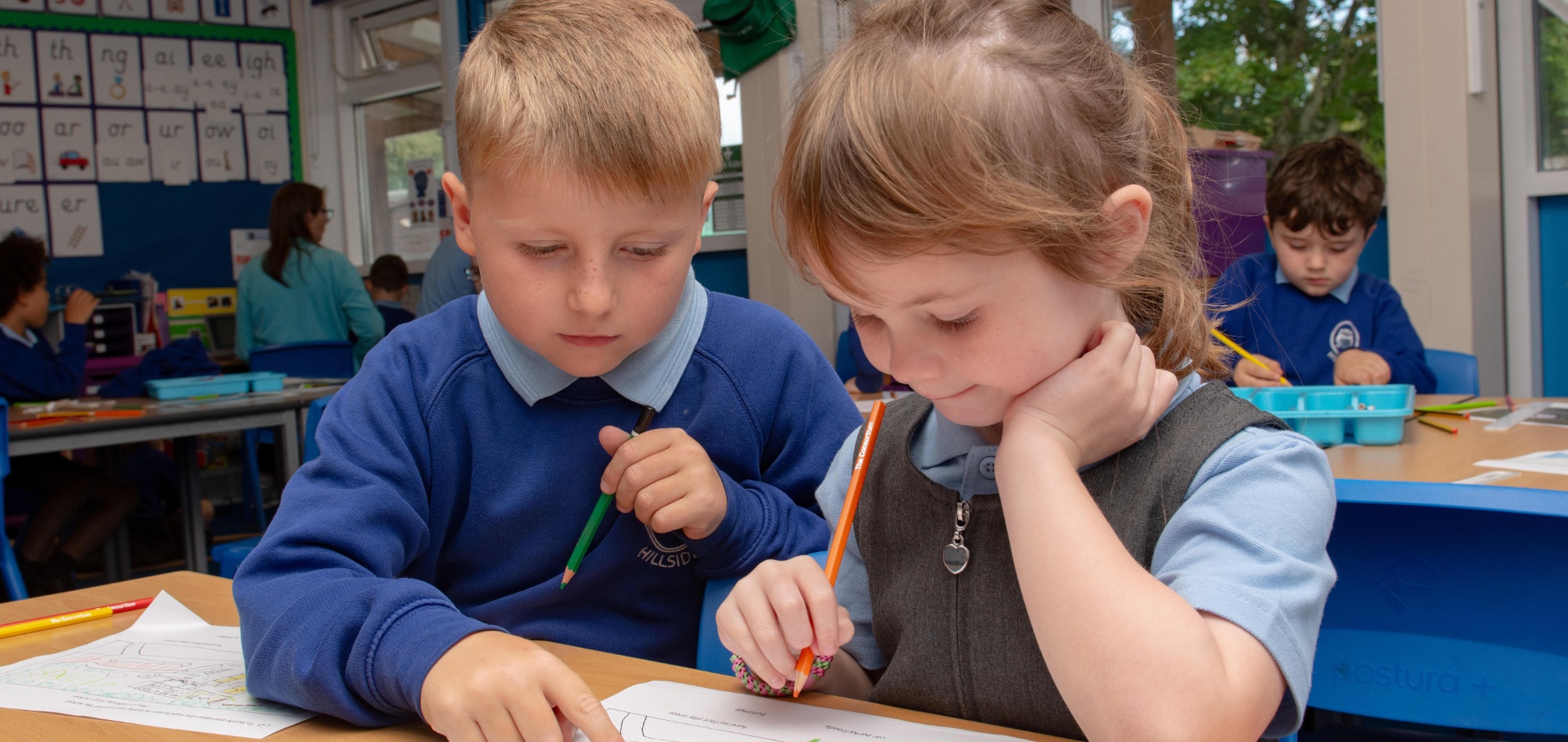Curriculum Statement
At Hillside First School we want our children to develop the best possible character and become respectful, resilient and compassionate citizens, who have the skills to succeed in our diverse, ever-changing global community.
To achieve this, our curriculum is designed to provide a progression of knowledge and skills, which pupils develop through inspiring, interconnected learning. Our curriculum remains flexible to respond to the needs and interests of our pupils and changes in the local community and wider world.
Each curriculum subject, and its associated knowledge and skills, is valued and afforded appropriate coverage. Subjects are either combined meaningfully in learning contexts that are thematic and age-appropriate, or they may be taught as discrete subjects, when it is considered that this will achieve the intended learning outcomes more effectively. Basic skills in English, mathematics and other subjects are regularly applied in cross curricular contexts.
Progression of learning in all subject areas is a key element of our curriculum. Skills and knowledge are carefully developed in all subject areas based on the National Curriculum Programmes of Study and locally agreed syllabuses. The school has high expectations of all pupils and provides varied, rich opportunities to inspire them to achieve their full potential across all subjects.
Assessment is used not only to inform teachers of progress, identifying gaps in pupils’ knowledge and skills, but also to reflect on the appropriateness and effectiveness of the taught curriculum, its design and implementation.
Leaders maintain a strong focus on the curriculum and are accountable for its design and implementation. All staff make valued contributions towards the planning, delivery and review of the curriculum in order to continually provide the best possible outcomes for our pupils.
We believe that our broad, rich curriculum and rights-respecting ethos prepares pupils to perform confidently in assessments and equips them with the tools to be successful learners with high aspirations for their future.
Phonics Scheme
We use Unlocking Letters and Sounds which was validated by the DfE in December 2021.
We begin teaching phonics in the first few weeks of term 1 in Reception and children make rapid progress in their reading journey. Children begin to learn the main sounds heard in the English Language and how they can be represented, as well as learning ‘Common Exception’ words for Phases 2, 3 and 4. They use these sounds to read and write simple words, captions and sentences. Children leave Reception being able to apply the phonemes taught within Phase 2, 3 and 4.
Please see document at the bottom of the page to support ‘Actions, Images and Letter Formation’ document.
In Year 1 through Phase 5a, b and c, they learn any alternative spellings and pronunciations for the graphemes and additional Common Exception Words. By the end of Year 1 children will have mastered using phonics to decode and blend when reading and segment when spelling. In Year 1 all children are screened using the national Phonics Screening Check.
In Year 2, phonics continues to be revisited to ensure mastery of the phonetic code and any child who does not meet age related expectations will continue to receive support to close identified gaps. For further details please see the Unlocking Letters and Sounds progression attachment at the bottom of the page.
To ensure no child is left behind at any point in the progression, children are regularly assessed and supported to keep up through bespoke 1-1 interventions. These include GPC recognition and blending and segmenting interventions. The lowest attaining 20% of pupils are closely monitored to ensure these interventions have an impact.
Reading Scheme
At Hillside First School we promote a 'phonics first' approach and in both our guided reading sessions at school and in the books children take home, texts are very closely matched to a child's current phonics knowledge so that every child can experience real success in their reading. In these crucial early stages of reading we primarily use books from Ransom Reading Stars Phonics to ensure complete fidelity to the Unlocking Letters and Sounds progression we follow.
Reading in Year 3 and 4 is taught through whole class reading lessons teaching specific reading skills; allowing pupils to access extracts of high quality texts and teaching all pupils to analyse the text in greater depth. Children are encouraged to develop as independent readers, discovering favourite authors amongst the well-stocked shelves across the school.
Writing is taught through high quality texts and learning experiences. Discrete grammar and spelling lessons are taught in every class. Pupils apply their learning independently, possibly with an element of choice, for example writing from the perspective of a chosen character. Following both personal and general whole class feedback or discussion pupils are encouraged to edit their writing.
Mathematics
Our progression of learning starts in Reception and builds beyond. We use a mastery approach to teaching mathematics using resources from NCETM mastering Number, White -Rose in Reception and Maths No-Problem Year 1-4. This approach is based upon the research from Bruner (Concrete, Pictorial, Abstract approach), Vygotsky (rich discussion & peer talk), Piaget (thinking processes rather than outcomes), Dienes (exploration before structure and a variety of methods) and Skemp (making links). Each topic is studied in depth and the teacher does not move to the next stage until all children demonstrate that they have a secure understanding of mathematical concepts.
Pupils are given time to think deeply about the maths and really understand concepts at a relational level rather than as a set of rules or procedures. This inclusive approach, and its emphasis on promoting multiple methods of solving a problem, builds self-confidence and resilience.
Curriculum Content:
Please click below on links for each year group curriculum content.






